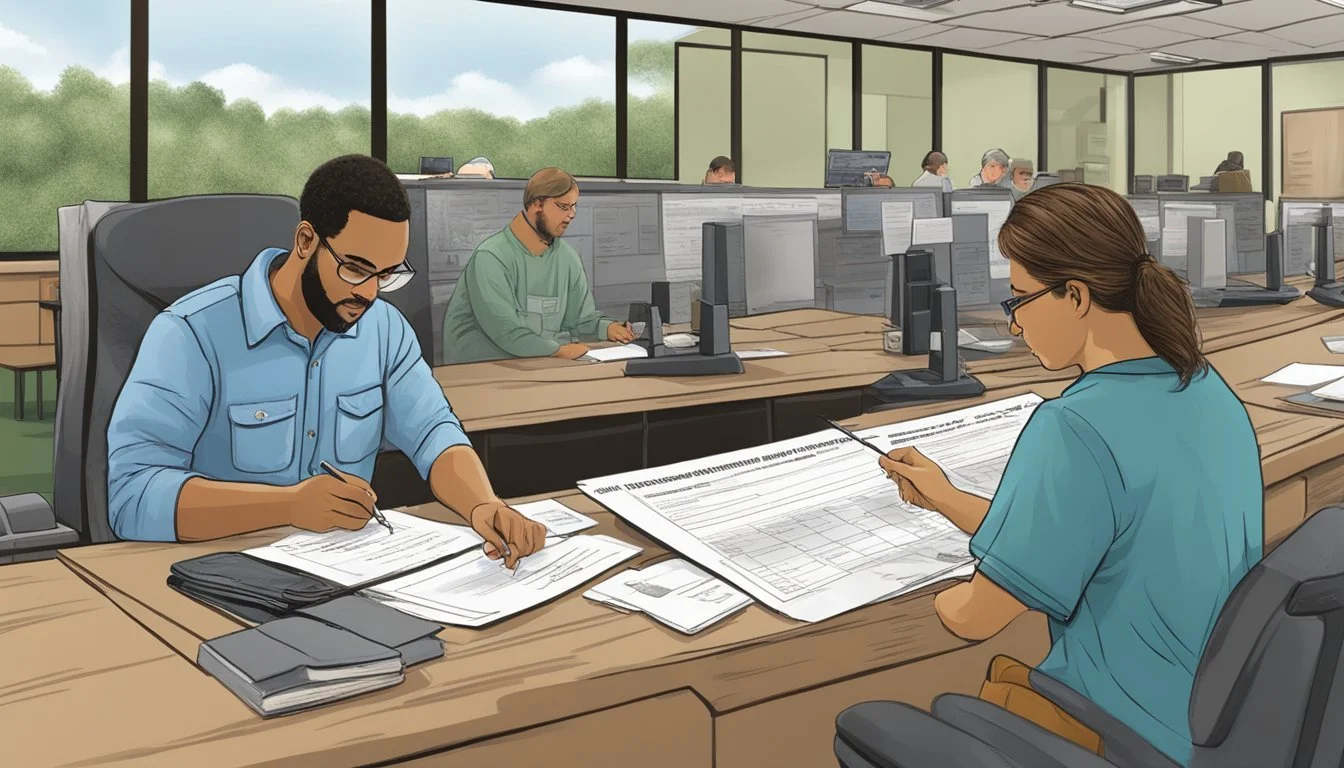How to Get a Georgia Freshwater Fishing License
A Step-by-Step Guide
In Georgia, anyone aged 16 and older interested in freshwater fishing must acquire a valid fishing license. The fishing license grants access to Georgia's freshwater bodies and contributes to the state's conservation efforts. Licenses are issued by the Georgia Department of Natural Resources' Wildlife Resources Division and require compliance with state regulations.
To purchase a fishing license, individuals have several options: online applications can be completed, in-person purchases at authorized locations, or phone transactions are available. This licensing is vital not only to legally fish in Georgia's freshwater lakes, rivers, and streams but also to support the management and protection of the state's aquatic ecosystems.
Residents and non-residents alike must adhere to the licensing requirements, with the details of the license—such as duration and specific privileges—varying based on the angler's preferences and status. Beyond fishing, a valid license also allows for participation in other recreational activities on state properties, such as hiking and birdwatching, making it a multifaceted investment in outdoor recreation.
Eligibility and Requirements
Obtaining a Georgia freshwater fishing license requires applicants to meet specific residency, age, and identification criteria. Different licenses are available depending on whether an individual is a resident or non-resident, with each having its own set of requirements.
Residency and Identification
Residents must provide a valid Georgia driver's license or a state-issued ID as proof of residency. Additionally, a Social Security Number (SSN) is mandatory for the purchase. For those without a driver's license, alternatives like a current utility bill, bank statement, or lease showing a Georgia address may suffice. Immediate family members of a resident licensee may also be eligible for resident licenses.
Age Requirements
Residents and non-residents age 16 and older are required to hold a valid fishing license. However, seniors who are residents and are age 65 and older may be eligible for a free or reduced-fee license. Youth under the age of 16 are exempt from holding a license.
Special Licenses for Residents
Georgia offers a variety of special licenses for residents, such as lifetime licenses and honorary licenses for certain groups like disabled veterans. Residents may also purchase an annual or short-term license depending on their needs.
Requirements for Non-Residents
Non-residents must provide proof of identification which could be a driver's license, passport number, U.S. travel visa number, or green card number. Non-residents can choose between an annual license or a short-term option, with fees differing from resident licenses. Proof of a Social Security Number is also required if applying for a fishing license in Georgia.
Types of Fishing Licenses
In Georgia, anglers can choose from a variety of licenses suited to different fishing activities, durations, and age groups. The Georgia Department of Natural Resources offers several license options to accommodate the needs of both casual and avid fishermen.
Annual Licenses and Permits
Georgia offers Annual Fishing Licenses for those interested in fishing in the state's freshwater bodies throughout the year. Residents and non-residents can purchase these licenses. Additionally, there are Annual Sportsman's Licenses available, which include fishing as well as hunting privileges.
Short-Term and Lifetime Licenses
For those visiting Georgia or planning a short fishing trip, Short-Term Fishing Licenses are available, such as a 1-day or 3-day license for both residents and non-residents. There are also Lifetime Licenses, which are a one-time purchase granting the holder fishing rights for life, an advantageous choice for those who fish frequently over multiple years.
Trout Licenses
To fish for trout, anglers must obtain a Trout License in addition to their regular fishing license. This permit is required due to the special management and conservation efforts needed to maintain trout populations. It's available as an annual or lifetime add-on.
Combo Licenses
For those who enjoy multiple outdoor activities, Georgia offers Combo Licenses which combine fishing with hunting. These combo licenses are convenient and often more cost-effective than purchasing separate licenses for each activity. They come in various forms, including annual and lifetime options.
Purchasing a Fishing License
Georgia offers several convenient methods for purchasing a freshwater fishing license, including online, in-person, and by phone, ensuring anglers can easily obtain their license and comply with state regulations.
Online Process
Georgia residents and non-residents can purchase a fishing license online 24/7 through the Go Outdoors Georgia website at gooutdoorsgeorgia.com. The process is straightforward:
Visit the site.
Navigate to the licensing section.
Select the required license type.
Complete the application details.
Proceed to payment.
Buyers can also use the Go Outdoors GA App, which offers a mobile-friendly alternative for license purchases.
In-Person Purchase
Those who prefer to buy their fishing license in person can do so at a variety of local agents throughout the state. The common in-person vendors include:
Sporting goods stores
Tackle shops
Large retailers
DNR offices
When visiting a local agent, the buyer should be prepared to provide identification and residency information as required.
By Phone Method
Anglers also have the option to purchase their fishing license by phone. They can contact the licensing representative at 1-800-366-2661 during the service hours:
Monday-Friday: 8:00 a.m.-6:00 p.m.
Saturday-Sunday: 9:00 a.m.-5:00 p.m.
During the call, the buyer will need to provide personal details and payment information over the phone to the licensing representative. After purchase, the representative will provide details on how the license can be received or accessed.
Regulations and Usage
Georgia offers diverse fishing regulations that cater to protecting and managing its aquatic resources while providing ample recreational opportunities. They enforce clear distinctions between freshwater and saltwater requirements, limits on fishing methods, and manage access to Wildlife Management Areas and Public Fishing Areas.
Freshwater vs. Saltwater Regulations
Georgia enforces distinct fishing regulations for freshwater and saltwater environments. Freshwater anglers aged 16 and older must have a current Georgia fishing license. In contrast, saltwater fishermen require a Saltwater Information Permit in addition to their fishing license unless they are fishing on a charter boat or are exempt due to age. These regulations are in place to ensure the proper management and conservation of the respective aquatic resources by the Department Of Natural Resources Division.
Fishing Methods and Limits
Anglers in Georgia must adhere to specific fishing methods as delineated by state regulations. These methods are designed to promote sustainable fishing practices and preserve fish populations. There are clear limits on the type and number of fish that can be taken, with special attention given to potentially vulnerable species and big game fish. For detailed information on gear restrictions and bag limits, one must consult the current Georgia Sport Fishing Regulations Guide.
Wildlife Management Areas
Accessing Georgia's Wildlife Management Areas (WMAs) and Public Fishing Areas (PFAs) requires either a valid hunting or fishing license or a Lands Pass. The rules here are strictly upheld to balance recreational usage with conservation efforts. WMAs and PFAs are directly overseen by the Wildlife Resources Division and provide crucial habitats for various species alongside recreational fishing opportunities. It is vital for visitors to understand that while these areas facilitate fishing, they also serve broader objectives like habitat protection and fisheries management.
Additional Information and Resources
When obtaining a Georgia freshwater fishing license, there are various circumstances and regulations to consider. This section will guide you through the process of replacing a lost license, keeping up with fishing regulation updates, locating public fishing areas, and accessing educational resources.
Replacing a Lost License
If a Georgia fishing license is lost or damaged, it can be reprinted. The Georgia Department of Natural Resources (DNR) enables anglers to reprint their license at no additional cost through their online portal, Go Outdoors Georgia, or at an authorized license vendor.
Fishing Regulations Updates
Staying informed on the latest fishing regulations is essential for legal and ethical angling. License holders are advised to frequently check the DNR website or sign up for newsletters to receive updates about changes in fishing regulations, such as size limits or catch and release guidelines.
Public Fishing Areas
Georgia boasts a selection of public fishing areas (PFAs) managed by the Wildlife Resources Division for conservation and public enjoyment. These areas often provide excellent opportunities for freshwater fishing in various settings like lakes, rivers, and ponds. Information on locations and amenities can be found on the DNR's website.
PFA Name Amenities Location Lake Winfield Scott Boat ramps, piers North Georgia Evans County PFA Fishing docks Southern Georgia
Educational Resources
For those new to angling or seeking to expand their knowledge, the DNR offers educational materials and programs. These resources cover topics such as fishing techniques, local species conservation, and habitats. They are available through the Wildlife Resources Division and other related agencies within the state's network of parks and natural resources.
Supporting Conservation and Wildlife
When individuals purchase a Georgia freshwater fishing license, they directly contribute to conservation efforts and wildlife resource management. These actions play a crucial role in sustaining the state's aquatic ecosystems for future generations.
Contribution Opportunities
Public Service: The Georgia Department of Natural Resources (DNR) offers various ways for the public to get involved in conservation efforts. By purchasing a fishing license, individuals also gain the opportunity to participate in programs and activities that support wildlife and habitats.
Volunteer Programs: Engaging in volunteer programs under the purview of the Wildlife Resources Division is another way to assist in conservation. These programs often include activities like habitat restoration and wildlife population surveys.
Fisheries Management and Research
Data Collection: Essential data for fisheries management is gathered through initiatives funded by license fees. These efforts include population assessments and habitat condition evaluations, which help to inform sustainable practices.
Research Projects: The Wildlife Resources Division conducts research projects aimed at understanding fish behavior, biology, and ecology. Ongoing studies support the development of effective management strategies that protect freshwater ecosystems.
Support through License Purchases
Financial Contribution: The sale of fishing licenses is a primary source of funding for the Wildlife Resources Division's conservation programs. These funds support various aspects of fisheries management, including fish stocking, habitat improvement, and access to fishing areas.
Licenses and Permits: Purchasing the appropriate license or permit is required for fishing in Georgia's freshwater bodies. Both residents and non-residents must comply with these regulations, which support the state's conservation initiatives.
By engaging with the Georgia DNR's licensing system, anglers play a critical role in conserving the state's natural aquatic resources and ensuring that wildlife thrives for the enjoyment of all.





